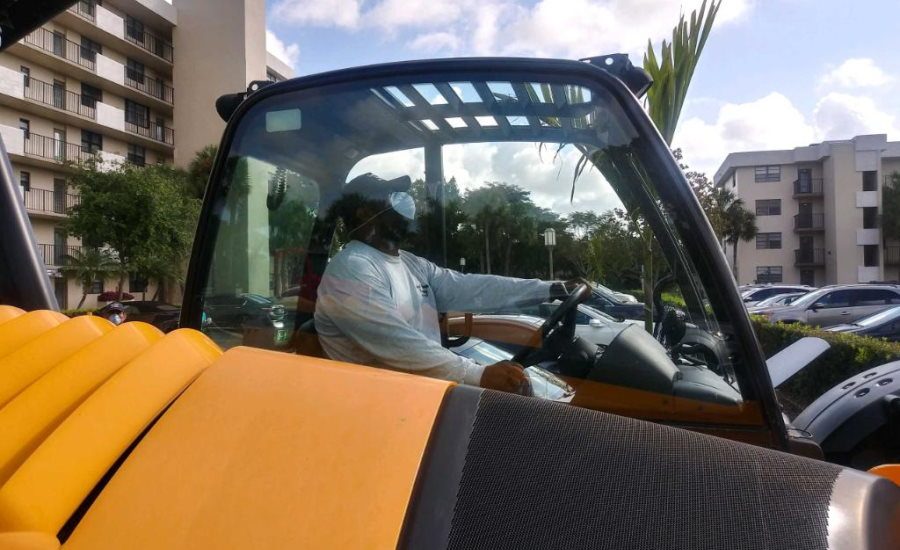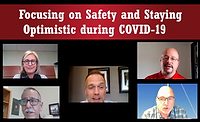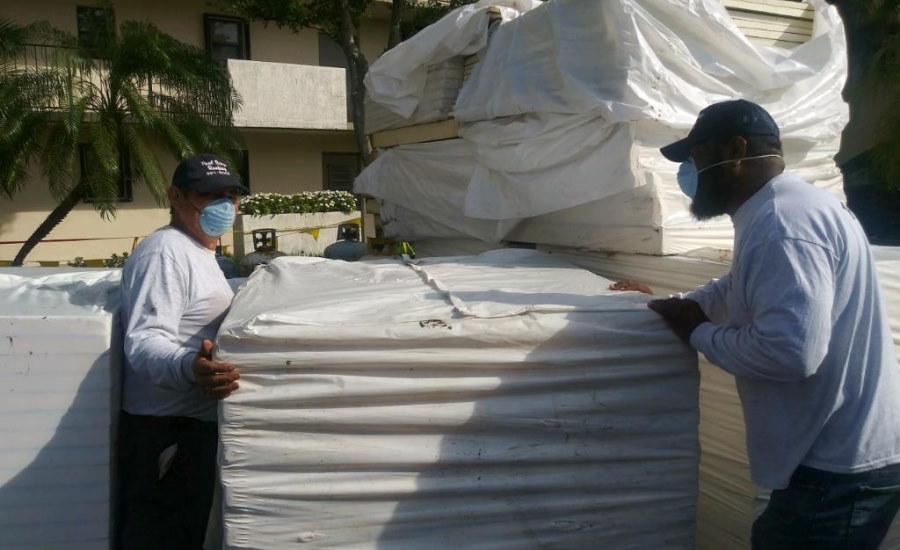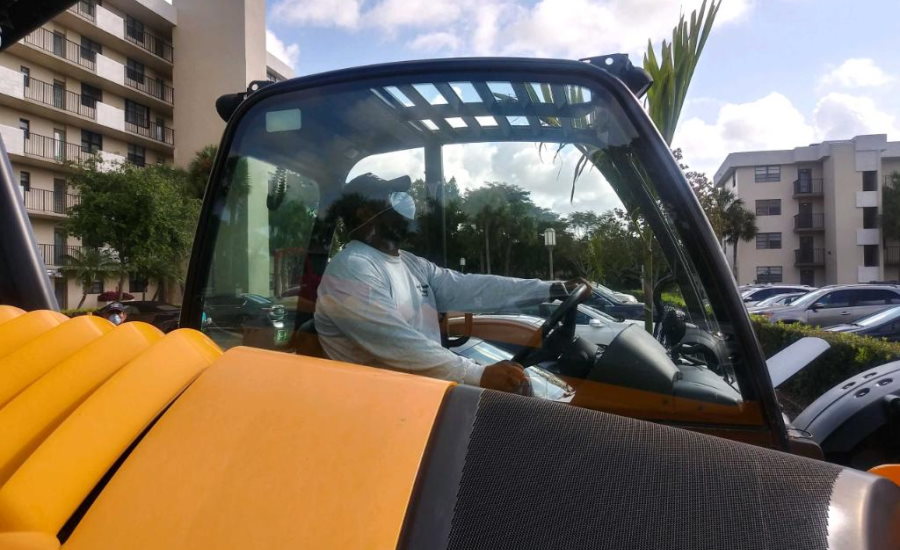How Roofing Contractors are Enduring the COVID-19 Pandemic

Employees with Paul Bange Roofing in Florida wear face masks to protect themselves while working. Photos courtesy of Paul Bange Roofing.





In Davie, Fla., workers with Paul Bange Roofing can be seen donning masks on a regular basis. It’s not because they’re working with airborne particles — it’s just the reality of working during the COVID-19 pandemic.
“We’re keeping works areas as clean as possible and have asked anyone that doesn’t feel well to stay at home,” said Cathy Ayala, commercial and roofing consultant with Paul Bange Roofing. “We support our staff in anything they need.”
These are just some of the new practices roofing contractors have had to deal with in order to stay in business thanks to the COVID-19 crisis, which has brutalized the economy and hurt business opportunities due to the need for social distancing and shelter-in-place orders.
Ayala said one of the biggest challenges contractors are facing is keeping employees safe and secure while they meet with clients who are nervous or anxious about COVID-19, but are in need of roofing services.
“We are using satellite imagery to prepare roofing proposals and the sales team is contacting homeowners by phone if they are concerned about the virus,” said Ayala. “A couple of sales guys have made sales by leaving paperwork in the mailbox. The client signs and puts back in the mailbox.”
But it’s not all doom and gloom. Ayala said the silver lining in these uncertain times is that roofing has proven to be an important part of people’s lives.
“We are essential workers in this economy and we have to be ready for the needs and calls from clients, so you must have procedures in place even before this pandemic hit,” Ayala said.
Is Roofing Essential?
As numerous state governments continue to call for the closure of non-essential businesses in an attempt to slow the spread of the virus, the question has emerged: Is roofing an essential business?
Cotney Construction Law CEO Trent Cotney said this has been the top issue his offices have dealt with since the pandemic took root. He said it can vary from state to state, but in general, most jurisdictions are following the standard protocol, which is deferring to the Department of Homeland Security guidelines that lists plumbers, electricians, exterminators, and other service providers as necessary during emergencies.
“We’ve interpreted that as being roofing, and my advice to roofing contractors out there is that in the event that you are unclear, go continue to do the work,” Cotney said. “Continue doing work unless you absolutely, 100% know you cannot do work.”
In an email to its clients, Lyons Roofing in Phoenix pointed to multiple sources, such as the New York and California governments, that have noted construction and infrastructure sectors are essential, and therefore are staying open for business.
“We are taking all precautions to protect the health of our employees and therefore you, our community. This again, so we can continue to offer service to our customers and protect the livelihood of our employees,” the email states.
As a result of COVID-19, though, Lyons Roofing had to put aside live phone answering during the COVID-19 pandemic and had to switch to digital communications, but is looking into technology to bring phone calls back into the picture.
While some states, like Oklahoma, have clarified that roofing is essential, other governments have taken steps in the opposite direction. In Boston, the government ordered the shutdown of construction projects. As of March 25, the mayor of Boston wants to extend the shutdown indefinitely, while Gov. Charlie Baker is looking to get rid of the ban.
Stephen Sandherr, CEO of the Associated General Contractors of America, said in a written statement that halting construction activity will do more harm than good for construction workers and their communities.
“Halting construction will do little to protect the health and safety of construction workers. But it will go a long way in undermining economic vitality by depriving millions of workers of the wages they will need over the coming days,” Sandherr said. “At the same time, these measures have the potential to bankrupt many construction firms who have contractual obligations to stay on schedule or risk incurring significant financial penalties.”
In an attempt to clear up the matter once and for all, the National Roofing Contractors Association (NRCA) kicked off a letter campaign last week to urge the Trump administration to provide clear guidance on roofing work being essential.
“I do think there ought to be some national guidance so that collectively as a society we can deal with this,” said NRCA CEO Reid Ribble. “We’re looking forward to having the federal government weigh in this week on a more clear guidance.”
Adapting and Surviving
Many contractors have implemented practices such as keeping workers home if they’re sick, social distancing, working remotely when able, and minimizing contact with clients by staying on the exterior of a building as much as possible.
While some contractors have struggled to switch from traditional in-person tactics and communications, others have made the transition smoothly thanks to technology. Curtis Sutton, President of Rackley Roofing in Nashville, announced on March 18 that 100% of the company’s office staff was working remotely.
“For our presentations, all will only be performed digitally until further notice. Our commercial inspections can be performed with or without your attendance as most of the information can be ascertained from aerial imagery and on the roof,” Sutton said in a Facebook post.
In a webinar from the Roofing Technology Think Tank, Rackley Roofing Chief Operating Officer Michelle Boykin said the company has been digital for several years using Dataforma, so the transition was fairly seamless.
“I think that it helps that we were already on this path and had things going on, but it’s really helping us see as owners who is passionate about their job and who’s really putting in the effort and it’s definitely going to have an impact in the future of who we let work from home and what our office looks like going forward,” Boykin said.
Ken Kelly, president of Kelly Roofing in Bonita Springs, Fla., said his business made the switch to being cloud-based due to operating in Florida, where hurricanes often upend operations. This has allowed Kelly Roofing to not only continue taking calls during the COVID-19 crisis, but set up call queues and round-robin systems so that a call is always funneled to someone who can answer.
“We’re still taking messages, entering it directly into our software system and we’re getting action because regardless of where we are, as long as we have internet access, we can communicate and negotiate,” Kelly said.
He suggested contractors examine the bottom 20% of their organizations and determine who they can furlough for a week or two and who they can try to keep working as long as the opportunity is there.
“What if, God forbid, one of them got COVID-19 or had the signs of flu and they needed to stay home and they were isolated? Do you have a number two that could step up and fill that void while we’re continuing to work? Identify that person now, have that conversation,” Kelly said.
Aside from adjusting business practices, roofers have been giving back as well. Beldon Group Chief Culture Officer and CEO Brad Beldon said his company donated all of its N95 masks to local doctors as well as face shields and hardhats and donated them as well. As a result, they are using bandanas to cover their faces when working.
“Our vendors, that’s where we’re having the problem — the Porta-Potties, the dumpsters, the cranes — I don’t think that everyone else was ready for the demand,” Beldon said.
Should any of their workers become ill, Beldon announced its own special COVID-19 Pandemic PTO program. Any team member diagnosed with COVID-19, or has come in contact with someone infected by the virus, is eligible to receive up to 10 days of “Pandemic Pay” if they have been quarantined by a license physician.
One message has come through clear, though: Roofing contractors should strap in for the long haul. Steve Little, head coach of KPost Roofing & Waterproofing in Dallas, said he anticipates that the slowdown caused by the virus will go to May 1 and has prepped the company’s operations around this belief.
“One thing we can do as leaders is to be calm,” Little said. “We have to make good decisions, not hasty decisions. We have to make decisions based on long term and what’s best for our companies and our employees and our clients and our suppliers and our families.”
The full extent of the COVID-19 pandemic’s effects have yet to be determined, but Little had a prediction of his own: Business has been changed forever.
“What I think is going to happen is, as the transition between baby boomers and the next generation, this is going to accelerate that, and people are going to see that we can conduct commerce without having to be in front of people — we can conduct business virtually,” he said. “If you don’t change with it, it will leave you in the dust.”
Looking for a reprint of this article?
From high-res PDFs to custom plaques, order your copy today!










